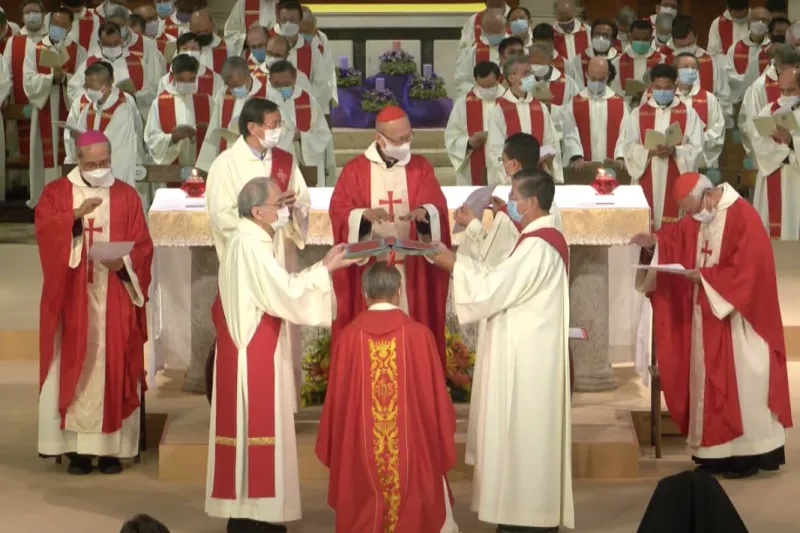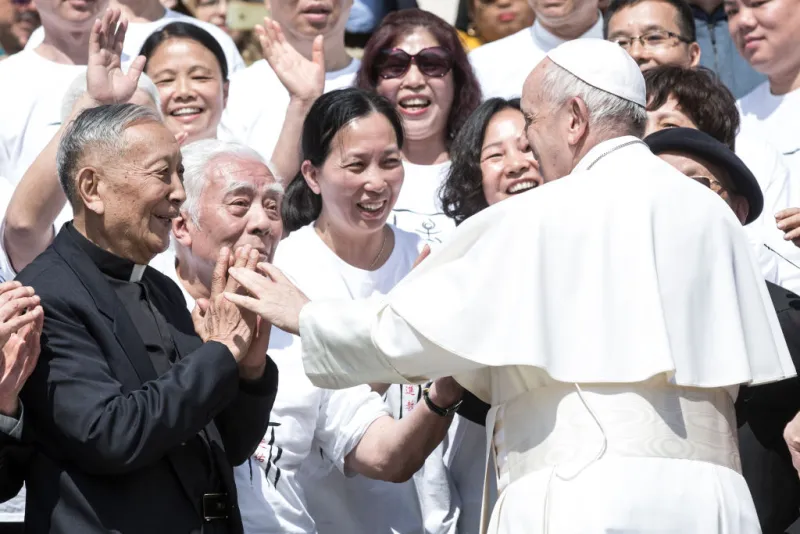 The episcopal consecration of Bishop Stephen Chow Sau-yan’s in Hong Kong’s Cathedral of the Immaculate Conception, Dec. 4, 2021 / Screenshot from livestream
The episcopal consecration of Bishop Stephen Chow Sau-yan’s in Hong Kong’s Cathedral of the Immaculate Conception, Dec. 4, 2021 / Screenshot from livestream
Denver Newsroom, Dec 31, 2021 / 11:00 am (CNA).
Four clerics have told Reuters that several bishops and other officials from the Chinese Catholic Patriotic Association met in October with senior clerics of the Diocese of Hong Kong to talk to them about sinicization, a Chinese government campaign to bring religion into its vision of culture, society, and politics.
“We all know the word sinicization carries a political agenda behind it, and they didn’t have to spell that out,” said one of the four Hong Kong clerics who spoke to Reuters about the meeting.
Sinicization was proposed by Chinese president Xi Jinping in 2015. The U.S. Commission on International Religious Freedom has called the effort “a far-reaching strategy to control, govern, and manipulate all aspects of faith into a socialist mold infused with ‘Chinese characteristics.”
Reuters’ report on the Oct. 31 meeting was published Dec. 30.
The Hong Kong Liaison Office, which represents the Chinese government in the special administrative region, arranged and monitored the encounter. Participating were three bishops and “about 15 religious figures” from the Patriotic Association, and “about 15 senior clergymen” of the Hong Kong diocese.
Two of the men who spoke to Reuters said the officials from the government-backed Church spoke about the compatibility of sinicization and inculturation, and one described Xi as the “elephant in the room” during the conversation.
“This was just the first step and I felt they knew that they could not come into this too heavy,” another said.
Several told Reuters that Bishop Stephen Chow Sau-yan of Hong Kong attended the meeting only a short time. The Jesuit was consecrated Dec. 4.
Hong Kongers have, historically, largely enjoyed political fredom and freedom of worship and evangelization, while in mainland China there is a long history of persecution of religious persons who run afoul of the government.
Beijing has in recent years tightened control over the island territory and cracked down on dissent.
The Hong Kong diocese has been divided in recent years over reactions to a movement protesting China’s increasing control over the special administrative region.
The Catholic Church in China has been split between the government-sanctioned Chinese Patriotic Catholic Association and the underground Church, which is persecuted and whose episcopal appointments are frequently not acknowledged by Chinese authorities.
In 2018, the Vatican reached an agreement with the Chinese government on the appointment of bishops in the country; the terms of the agreement, which was renewed in October 2020 for two more years, have never been fully revealed. It is meant to help unite the Patriotic Association and the underground Church.
The October meeting’s focus on the compatibility of sinicization and inculturation is not novel.
Fr. Benoit Vermander, a Jesuit priest in China, attempted to outline a path for “sinicization” of religion in a March 2018 issue of La Civiltà Cattolica, whose publication is overseen by the Secretariat of State.
While there are “evident dangers” in following a top-down policy that can bring “a substantial loss of identity,” he argued, Catholics should not avoid sinicization simply because it is government backed. Rather, despite the problems created by the policy, dialogue between Catholics and the communist government is needed.
Fr. Vermander argued that Christians should listen to the government’s appeal for sinicization and “examine which kind of changes it could lead them to imagine and undertake,” while “being aware of the danger.”
And in May 2019 Cardinal Pietro Parolin, Vatican Secretary of State, said that inculturation and sinicization can be “complementary” and “can open avenues for dialogue.”
“These two terms, ‘inculturation’ and ‘sinicization,’ refer to each other without confusion and without opposition,” he told the Global Times, an English-language newspaper owned by the People’s Daily, the official newspaper of the Central Committee of the Communist Party of China.
“For the future, it will certainly be important to deepen this theme, especially the relationship between ‘inculturation’ and ‘sinicization,’ keeping in mind how the Chinese leadership has been able to reiterate their willingness not to undermine the nature and the doctrine of each religion,” Cardinal Parolin said.
“Inculturation is an essential condition for a sound proclamation of the Gospel which, in order to bear fruit, requires, on the one hand, safeguarding its authentic purity and integrity and, on the other, presenting it according to the particular experience of each people and culture,” he said.
[…]








